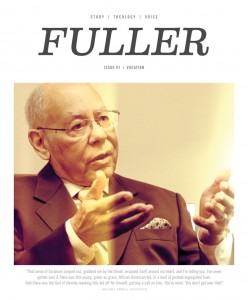“At this point in your journey, how do you envision your call to God’s mission in the world?”
“¿Cómo visualiza usted su llamado a la misión de Dios en este mundo?”
“당신은 세상 속에서 하나님의 선교로의 부르심을 어떻게 그리고 있습니까?”
The inboxes of my life are filled with material on vocation. I am not new to the subject. Indeed, since my days of graduate study with the late theologian Ray Anderson, the question of vocation has occupied me long past the realization of my own. Ray was the one who taught me the wisdom that I have often passed on to others: “There is no place or task on earth which can satisfy the restless hand which is not attached to the heart.” Decades later, I am the new Vice President of Vocation and Formation at the same institution that introduced me to that life-changing mentor. And, as of July 2014, my vocation is vocation.
It turns out a lot of people are talking about calling these days. My colleague Daniel Kirk shared this insight from Sam Wells: “Discernment of vocation is the identification of that form of service through which you will find perfect freedom.” Mark Labberton is the man who asked me to lead the discovery process around vocation and formation in the community at Fuller, and he knows well that freedom and joy are key markers in their pursuit. My “yes” was to something even deeper than the president’s request, however, or why would I leave the best job among the most loving people with the most beautiful ocean view on earth? Vocation.
Vocation is more than a job, it’s the voice that calls to the deepest part of your self, the thing that gives your life meaning because it is what God has created you to do. But a calling, to truly be a calling, is about more than just our own fulfillment. Because God “loves the world,” calling is always about the world too. Or as I have come to say, vocation is identity expressed in service to God’s mission in the world.
In the last year as I’ve been turning my attention to this challenge, a question has evolved: “At this point in your journey, how do you envision your call to God’s mission in the world?” The key word is envision. Calling is more about a vision than a title, more about a picture of oneself in the world than a title on the office door or a label on a business card. It’s more art than science. Readers will discover a sampling of answers in the following pages, along with several perspectives on the subject of vocation in a changing world. These will contribute to our ongoing conversation as we, together, attempt to discern and, with God’s help, answer the call on our lives.
“The idea that I would be called to something that’s not somehow embedded within my church community, that doesn’t arise out of my church—and out of ministry experience in my church—is really quite foreign to me. We tend to think of call and vocation as part of the experience of what you might call ‘us-ness’ or ‘with-ness.’ Wesleyan ways of thinking about church structure are deeply embedded in accountability; in meeting together; in conferencing, as we sometimes call it; in struggling together over issues. Vocation arises out of that.”
—Joel B. Green
Los archivos de mi vida están llenos de materiales acerca de la vocación. Este tema no es nuevo para mí. Ciertamente, desde mis días de estudios de pos-grado con el difunto teólogo Ray Anderson, la pregunta acerca de la vocación me ha mantenido ocupado mas allá de la realización de la mía. Ray fue el que me enseñó la sabiduría que muchas veces he transmitido a otras personas: “No hay lugar o tarea en esta tierra que pueda satisfacer la mano inquieta que no está sujeta al corazón.” Décadas después, soy el nuevo Vice-Presidente de Vocación y Formación dentro de la misma institución que me introdujo al mentor que cambió la trayectoria de mi vida. Y, desde julio del 2014, mi vocación es la vocación.
Tal parece que en estos días muchas personas están hablando acerca del llamado. Mi colega Daniel Kirk compartió esta idea de Sam Wells: “El discernimiento de la vocación es la identificación de aquella forma de servicio por la cual usted encontrará la perfecta libertad.” Mark Labberton fue la persona que me preguntó si deseaba llevar adelante el proceso de descubrimiento concerniente a la vocación y formación en la comunidad de Fuller, y él conoce claramente que la libertad y el gozo son señales importantes en este proceso de descubrimiento. Sin embargo, mi “sí” fue una respuesta más profunda que la comisión del Presidente. ¿Por qué dejaría yo el mejor trabajo, entre la gente más amorosa, con una de las vistas más hermosas hacia el mar? Vocación.
La vocación es más que un trabajo, es la voz que llama a lo más profundo del ser, aquella que le da significado a la vida porque ésta es exactamente la razón por la cual Dios nos ha creado. Pero el llamado, para ser verdaderamente un llamado, es mucho más que la realización de uno mismo. Porque Dios “ama al mundo,” el llamado también siempre será acerca de este mundo. Como vengo diciendo, la vocación es la identidad expresada en el servicio a la misión de Dios en el mundo.
En este último año a medida que mi atención va dirigida más hacia este nuevo reto, surge una pregunta: “¿Como visualiza usted su llamado a la misión de dios en este mundo?” La palabra clave es visualiza. El llamado es más acerca de la visión que el título, más acerca de la forma en que nos visualizamos en este mundo que el título en la puerta de nuestra oficina, o el titulo en nuestra tarjeta de negocio. Es más arte que la ciencia. Los lectores y las lectoras descubrirán una muestra de respuestas en las siguientes páginas, juntamente con diferentes perspectivas sobre el tema de la vocación en un mundo que cambia constantemente. Estas respuestas contribuirán a nuestro continuo diálogo a medida que tratamos de discernir y, con la ayuda de Dios, responder al llamado en nuestras vidas.
“In the main it is not by introspection but by reflecting on our living in common with others that we come to know ourselves. What is revealed? It is an original creation. Freely the subject makes himself what he is, never in this life is the making finished, always it is in process, always it is a precarious achievement that can slip and fall and shatter.”
—Bernard Lonergan
제 삶의 수신함에는 소명과 관련된 많은 재료들이 가득합니다. 저에게는 결코 이 주제가 생소하지 않습니다. 사실 소명에 대한 질문은, 고 레이 앤더슨(Ray Anderson) 교수님에게 배웠던 신대원시절 이래로, 제 자신의 소명을 깨닫고 난 이후에도 오랫동안 제 뇌리속을 맴돌고 있습니다. 레이 교수님은 제가 종종 다른 사람들에게 나누곤 하는 지혜를 가르쳐 준 분이었습니다. “마음에서 우러나지 않은 채로 부단히 움직이는 손을 만족시킬 수 있는 장소나 일은 세상 그 어디에도 없다.” 수십년이 지나, 저는 제 삶을 변화시킨 그 멘토를 만나게 해주었던 학교의 소명과 영성 형성 담당 부총장이 되었습니다. 2014년 7월부터 학생들이 소명을 분별하도록 돕는 일이 제 소명이 된 것입니다.
오늘날 많은 사람들이 부르심에 대해 이야기 하곤 합니다. 동료인 다니엘 커크 교수님은 샘 웰스에게 배운 다음과 같은 통찰을 제게 소개해 주었습니다. “소명을 분별한다는 것은 당신이 온전한 자유를 누릴 수 있게 만들 바로 그 섬김의 형태를 알아내는 것이다.” 마크 래버튼 총장님은 제게 풀러 공동체 안에서의 소명의 분별 과정과 영성 형성을 이끌어 달라고 부탁하셨습니다. 총장님은 자유와 기쁨이 이러한 과정에서 중요한 표지라는 사실을 잘 알고 계셨습니다. 그러나 제가 이 일을 맡기로 한 것은 단순히 총장님의 요청을 수락하는 그 이상의 의미를 바라봤기 때문입니다. 그렇지 않다면 왜 제가 가장 사랑스러운 분들이 있는, 지구상 가장 아름다운 바다의 전망을 가진 교회를 떠나 이곳에 왔겠습니까? 바로 소명 때문입니다.
소명은 직업 그 이상을 의미합니다. 소명은 여러분 각자의 내면 가장 깊은 곳에서 들리는 목소리입니다. 소명은 하나님께서 여러분이 그것을 행하도록 지으셨기 때문에 여러분의 삶을 의미있게 해 주는 것입니다. 그러나 진정한 의미에서의 부르심은 단순한 자기 성취 그 이상입니다. 하나님께서 “세상을 사랑하시기” 때문에 하나님의 부르심 또한 항상 세상에 대한 것입니다. 그런 점에서 저는 소명을 세상 속에서 하나님의 선교를 위한 섬김으로 표현된 정체성이라고 정의하고 싶습니다.
지난 해 제가 이같은 도전에 관심을 갖기 시작하면서, 한가지 질문이 생겼습니다. “그리스도인으로서의 여정 가운데 지금 이순간 나는 내 인생에 대한 하나님의 부르심을 어떻게 그리고 있는가?” 여기서 핵심 단어는 “그리다(envision)”입니다. 부르심은 단순한 직함 이상의 비전에 대한 것입니다. 부르심은 사무실 문패나 명함에 들어가는 직함에 대한 것이라기보다는 세상 속에서의 자신의 모습에 대한 것입니다. 부르심은 과학이라기보다는 예술이라고 할 수 있습니다. 독자들은 다음 페이지들에서 변화하는 세상 속에서의 소명이라는 주제에 대한 다양한 관점들과 더불어, 그 실례가 되는 답들을 접하게 될 것입니다. 이 내용들은, 우리가 각자의 인생에 대한 하나님의 부르심을 함께 분별하고 하나님의 도우심을 입어 그 부르심에 응답하려 시도할 때, 우리가 대화를 이어갈 수 있게 해줄 것입니다.
“It is only when we are knit together that we ‘have nourishment from Him, and increase with the increase of God.’ Neither is there any time, when the weakest member can say to the strongest, or the strongest to the weakest, ‘I have no need of thee.’ Accordingly our blessed Lord, when his disciples were in the weakest state, sent them forth, not alone, but two by two. When they were strengthened a little, not by solitude, but by abiding with him and one another, he commanded them to ‘wait,’ not separate, ‘but being assembled together,’ for ‘the promise of the Father.’”
—John Wesley
Preface to Hymns and Sacred Poems


